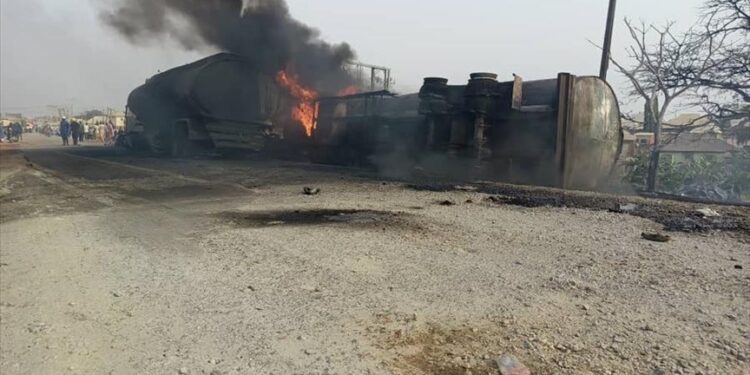- 172 oil tanker accidents and 1,896 deaths reported since 2009
- 2024 sees highest death toll, with 266 fatalities
ISTANBUL
The latest oil tanker explosion, which killed nearly 98 people in Nigeria, has brought attention to the alarming death toll from such incidents since 2009.
A data analysis by Anadolu on Tuesday revealed that these accidents have resulted in approximately 1,896 fatalities over the past 16 years.
The most recent tragedy occurred on Saturday in Niger state, located in north-central Nigeria.
Until October 2024, 2019 had the highest number of oil tanker accidents and fatalities, according to a study published in the Nigerian Research Journal of Engineering and Environmental Sciences.
However, a catastrophic explosion on Oct. 15, 2024, in Majia, a town in the Taura Local Government Area, claimed 181 lives. This incident made 2024 the deadliest year on record, with a total of 266 fatalities.
Between January 2009 and January 2025, Nigeria recorded 172 oil tanker fires and explosions, which caused 1,896 deaths.
The study identified several key factors contributing to these accidents, including individuals collecting spilled fuel, tanker crashes in crowded areas, vehicle collisions, and human errors.
More than 100 incidents were linked to human-related factors, according to a research.
In 2000, the Nigerian government introduced a fuel subsidy to lower fuel costs by providing direct financial support to oil companies.
After taking office in May 2023, President Bola Tinubu ended the decades-old subsidy policy, arguing that it disproportionately benefited the wealthy while neglecting the poor.
The government had previously spent trillions of naira annually on subsidies for petroleum products. Tinubu stated that the subsidy had been financed through cash generated by private companies, as the government was “incapable of covering the subsidy expenses owed to the corporation.”
Since Tinubu’s decision to remove subsidies, Nigeria has reported 28 oil tanker accidents, resulting in 468 deaths. These incidents account for over 15% of all accidents and nearly 25% of the fatalities recorded since 2009.






